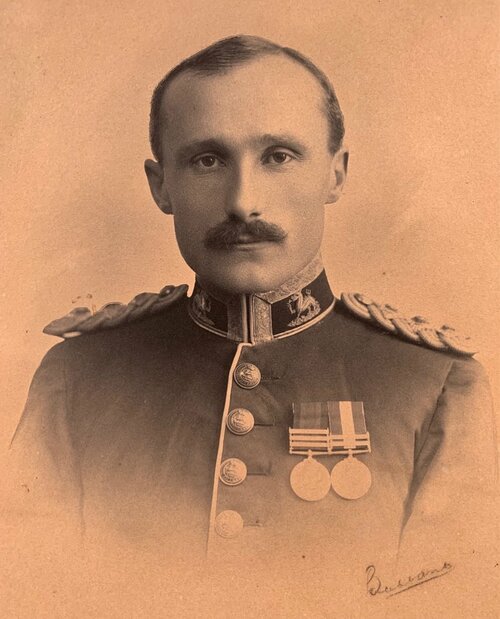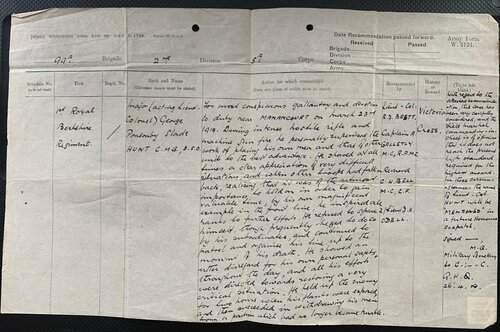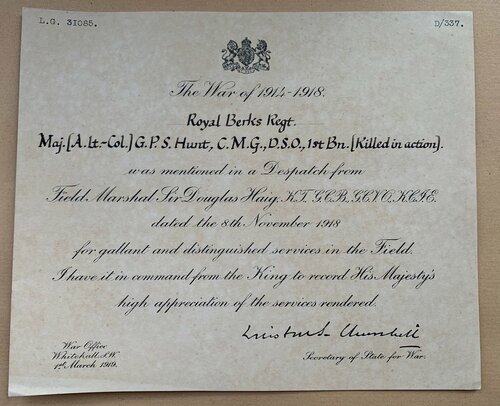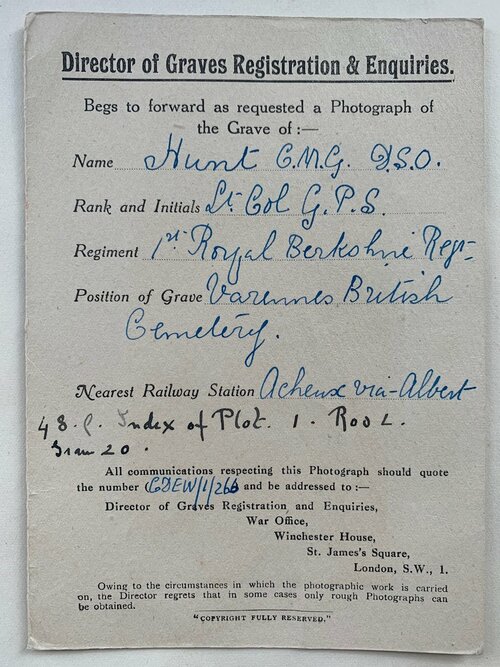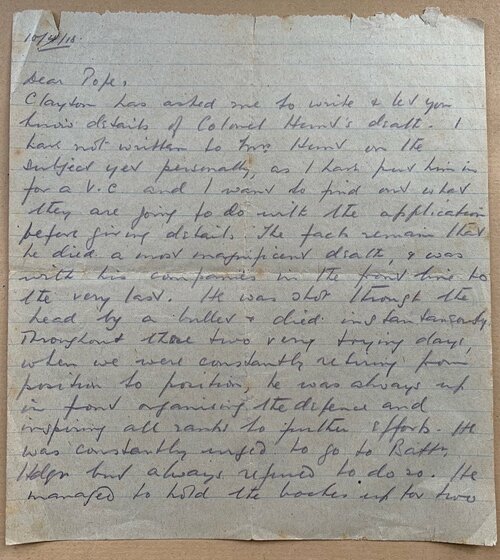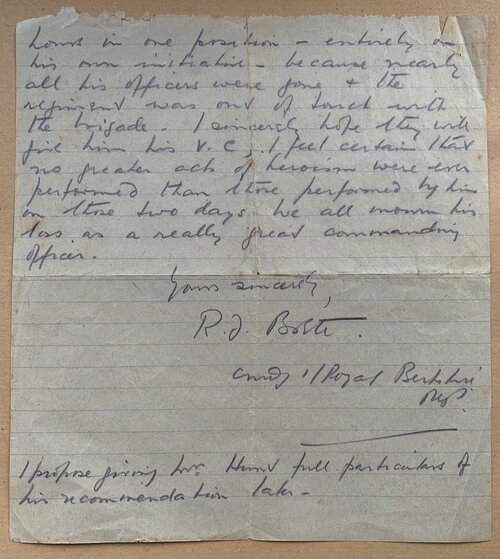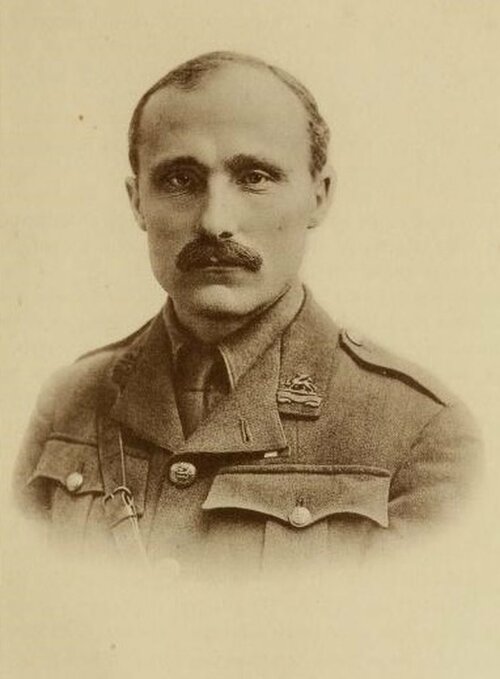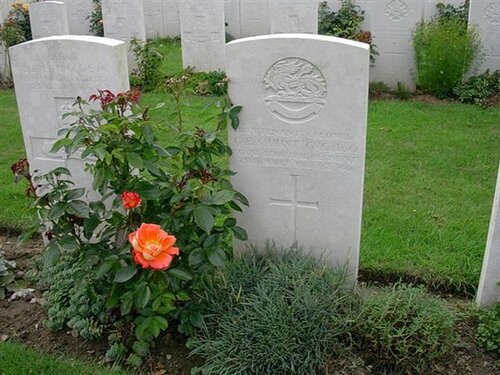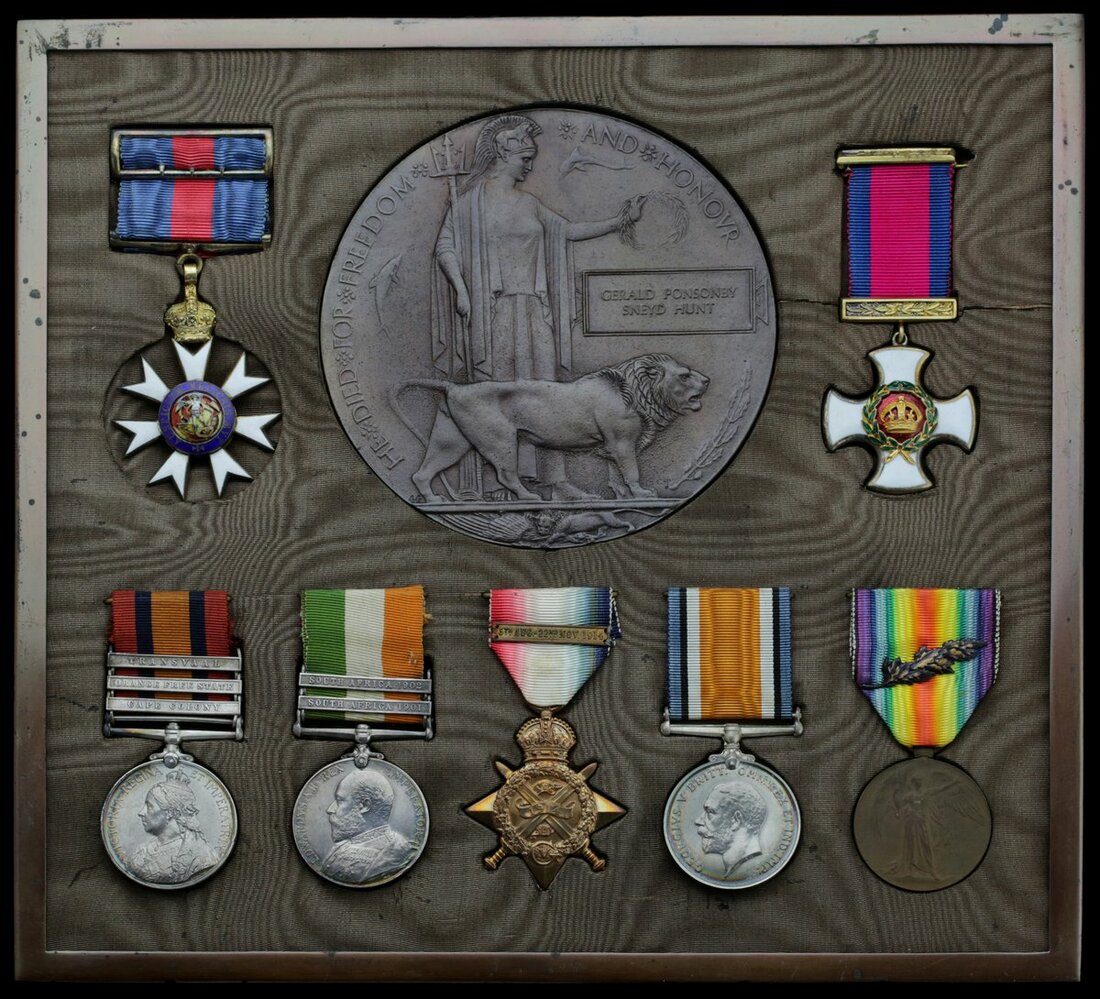Auction: 21001 - Orders, Decorations and Medals (conducted behind closed doors)
Lot: 341
'He managed to hold the Boches up for two hours in one position - entirely on his own initiative - because nearly all his Officers were gone and the Regiment was out of reach with the Brigade. I sincerely hope they will give him his V.C., I feel certain that no greater acts of heroism were ever performed than those performed by him on those two days. We all mourn his loss a a really great Commanding Officer.'
A comrade on his loss.
The remarkable Great War Battalion C.O.'s C.M.G., D.S.O. group of eight awarded to Brigadier-General G. P. S. Hunt, Royal Berkshire Regiment, who having won himself both decorations and a trio of 'mentions', was recommended for the Victoria Cross for his glorious leadership of the 1st Battalion near Manancourt on 23 March 1918; having held the enemy up for several hours and been begged by his subordinates to leave the frontline with his men, he was shot through the head by a sniper and killed instantaneously
The Most Distinguished Order of St. Michael and St. George, C.M.G., Companion's breast Badge, silver-gilt and enamel; Distinguished Service Order, G.V.R., silver-gilt and enamel, with top riband bar; Queen's South Africa 1899-1902, 3 clasps, Cape Colony, Orange Free State, Transvaal (Lieut: G. P. S. Hunt. Rl: Berks: Regt); King's South Africa 1901-02, 2 clasps, South Africa 1901, South Africa 1902 (Lt. G. P. S. Hunt. Rl. Berk. Rgt.); 1914 Star, with clasp (Capt: G. P. S. Hunt. R. Berks: R.); British War and Victory Medals, with M.I.D. oak leaves (Brig. Gen. G. P. S. Hunt.); Great War Bronze Memorial Plaque (Gerald Ponsonby Sneyd Hunt), third and fourth with light contact marks, otherwise nearly extremely fine, housed within a contemporary display frame as lovingly viewed by his widow (8)
C.M.G. London Gazette 14 January 1916.
D.S.O. London Gazette 18 February 1918:
'For conspicuous gallantry and devotion to duty. He established and organised the line after an attack by siting a series of posts on commanding ground. During an enemy attack he held his position against repeated thrusts by the enemy, although his right flank was exposed, and when touch was lost with the brigade on his right he re-established communication. He showed splendid leadership and courage.'
M.I.D. London Gazette 30 November 1915, 1 January 1916, 7 April 1918 and 8 November 1918 (posthumous). The last recommendation, originally for the Victoria Cross states:
'For most conspicuous gallantry and devotion to duty near Manancourt on March 23rd 1918. During intense hostile rifle fire and machine gun fire he personally supervised the work of placing his own men and those of other units to the best advantage. He showed at all times a clear appreciation of very difficult situations, and when other troops had fallen back, realising that it was of the utmost importance to hold on in order to gain valuable time, by his own magnificent example in the front line, he inspired all ranks to further efforts. He refused to spare himself, though frequently begged to do so by his subordinates, and continued to patrol and organise his line up to the moment of his death. He showed an utter disregard for his own personal safety throughout the day, and all his efforts were directed towards restoring a very critical situation. He held up the enemy for two hours when his flanks were exposed, and then succeeded in withdrawing his men from a position which had no longer become tenable.'
Gerald Ponsonby Sneyd Hunt was born on 24 July 1877, was educated at Harrow and was commissioned 2nd Lieutenant in the Royal Berkshire Regiment on 8 September 1897. Having seen active service in the Boer War, including being commandant at Wildfontein (Queen's Medal & 3 clasps, King's Medal & 2 clasps), he was promoted Captain on 11 February 1905, whilst with the 2nd Battalion in Egypt. He was then posted to the depot at Reading, returned to his Battalion in India, and was at Jhansi when mobilization was ordered.
Hunt served with the 1st Battalion in France from 6 November 1914 and was clearly in the thick of the action, for his was wounded early in 1915. Hunt was soonafter given command of his old Battalion when Lieutenant-Colonel H. M. Finch was killed at the Battle of Fromelles on 9 May 1915. Promoted Temporary Major on the 17 June 1915. He was with his battalion in the severe fighting at Bois Grenier on 25 September, at the time of the Battle of Loos. The Official History gives further detail of the attack:
'The attack by the III Corps (Lieut-General Sir W P Pulteney) on the left of the Indian Corps, was carried out at 4.30am, by the 8th Division (Major-General H Hudson) without gas, but with smoke to cover the flanks, from the neighbourhood of Bois Grenier (south of Armentières), which gives its name to the action. It was preceded by a bombardment on the previous day and five minutes short, sharp fire.
The general idea of the operation was to push through towards Fournes and eventually affect a junction with the Indian Corps on Aubers Ridge. Three battalions of the 25th Brigade (Br-General R B Stephens), the 2/Rifle Brigade (Lieut-Colonel F H Nugent), 2/R Berkshire (Lieut-Colonel G P S Hunt), and 2/Lincolnshire (Lieut-Colonel S Fitz G Cox) assaulted the German position on a frontage of 1,200 yards, between Corner Fort and Bridoux Fort, two works in the German front line. The attack started promisingly. The front trench, including both Corner and Bridoux Forts, was carried in the first rush, and 3 officers and 120 men of the 16th Bavarian Reserve Regiment were taken prisoner. The Lincolnshire, on the left, pressed on and took a considerable length of the support trench. At one part only, a front of three hundred yards at the junction of the lines of the Rifle Brigade and the Berkshire, was the attack held up, machine guns in Angle Point, a small work in the front line, repulsing all assaults. After the first rush the Germans on the flanks and in Angle Point maintained a continuous fire on No Man’s Land, so that reinforcements with ammunition were unable to cross it. At 1pm a determined counter-attack drove back the Lincolnshire on to Bridoux Fort, and shortly afterwards German bombers forced them back from the captured front trench, the survivors, together with two companies of the 1/R Irish Rifles (Lieut-Colonel R A C Daunt), which had come up in support, withdrawing along the dykes to their original starting trenches. By 2pm the position of the Berkshire, now hard-pressed on both flanks, both from Bridoux Fort and Angle Point, also became untenable, and Colonel Hunt ordered them to withdraw to their original trenches. At Corner Fort the right of the Rifle Brigade continued to hold on and beat off several counter-attacks, two trench mortars brought up into the work assisting greatly in keeping off the German bombers. It was felt, however, that the retention of this isolated position would not be worth the losses it would entail, and at 3.30pm the defenders were ordered to withdraw, the movement being skilfully carried out with little loss. Advantage had been taken during the attack to dig a new trench, which was completed during the night, across the re-entrant in the British line at this point, thereby reducing the frontage considerably and cutting out a weak point in the sector.'
The attack had cost the Berkshire's 7 Officers killed and 5 wounded, with 32 ORs killed, 216 wounded and a further 143 missing in action.
In December 1915 Hunt was appointed to Command a Territorial Infantry Brigade and thus made a Temporary Brigadier-General. He went back to England in order to go up to Buckingham Palace for the investiture of his C.M.G. on 8 March 1916. His appointment as Brigadier-General was as GOC 173 Brigade, 58th
Division. The Brigade was formed in 1915 and first went to France in January 1917. Hunt was replaced as GOC on 20 April 1917 by Bernard Freyburg, fresh from winning his V.C. and later Lieutenant-General Bernard Cyril Freyberg, 1st Baron Freyberg, VC, GCMG, KCB, KBE, DSO & Three Bars.
Never far from the action, he took the demotion in the right spirit and forged ahead, assuming command of the 1st Battalion of the Royal Berkshires on 3 May 1917 (https://etheses.bham.ac.uk/id/eprint/6503/1/Harvey16PhD.pdf, ‘An Army of Brigadiers’ - British Brigade Commanders at the Battle of Arras 1917 T. G. Harvey, refers. His Battalion would be heavily engaged at Cambrai from 26 November-4 December. That command would thence last for 310 straight days in the field, only being cut short by his gallant death on 23 March 1918, two days into the German Spring Offensive of 1918. Their War Diary (TNA WO95/1371 refers) gives its own abridged account:
'They had scarcely got into position when the enemy came in sight and a rearguard action commenced and we withdrew in stages via the cemetery at ETRICOURT (where Capt. P.L. MOUSELEY was wounded), LICHELLE WOOD (where the Commanding Officer Lt. Col. G.P. Hunt, CMG, DSO was killed while gallantly rallying all troops within reach).'
The actions of Hunt in the hours prior to his death are best recalled in the aforementioned recommendation, with his comrades of the view that the actions deserved the award of the Victoria Cross. A letter from the Lieutenant-Colonel who assumed command to a fellow Officer on 10 April 1918 states:
'Dear Pope, Clayton has asked me to write and let you know details of Colonel Hunt's death. I have not writted to Mrs Hunt on the subject yet personally, as I have put him in for a V.C. and I want to find out what they are going to do with the application before giving details. The fact reamins that he died a most magnificent death, I was with his Companies in the Front Line to the very last. He was shot through the head by a bullet and died instantaneously. Throughout those two very trying days, when we were constantly retiring from position to position, he was always in front organising the defence and inspiring all ranks to further efforts. He was constantly ordered to go to Battn HQ but always refused to do so. He managed to hold the Boches up for two hours in one position - entirely on his own initiative - because nearly all his Officers were gone and the Regiment was out of reach with the Brigade. I sincerely hope they will give him his V.C., I feel certain that no greater acts of heroism were ever performed than those performed by him on those two days. We all mourn his loss a a really great Commanding Officer.'
The recommendation was downgraded to a posthumous 'mention' by the Field-Marshal, with Hunt being buried in the Varennes Military Cemetery, aged 40.
Sold together with the following original archive:
(i)
Memorial Scroll, named 'Lieut.-Col. Gerald Ponsonby Sneyd Hunt, C.M.G., D.S.O., Royal Berkshire Regiment'
(ii)
Bestowal document and Certificate for the C.M.G.
(iii)
Bestowal document for the D.S.O.
(iv)
Three of his M.I.D. certificates, with forwarding letters, the award for 8 November 1918 being named 'Maj.(A.Lt.-Col.) G. P. S. Hunt, C.M.G., D.S.O., 1st Bn. Royal Berks Regt. (Killed in action).'
(v)
An old copy of the recommendation for the Victoria Cross, as sent to his widow.'
(vi)
Letters to his widow from the Padre and fellow Officers.
(vii)
Forwarding letter for his 1914 Star, besides correspondance related to his burial from the War Graves Commission.
Subject to 20% VAT on Buyer’s Premium. For more information please view Terms and Conditions for Buyers.
Sold for
£7,000
Starting price
£6000


